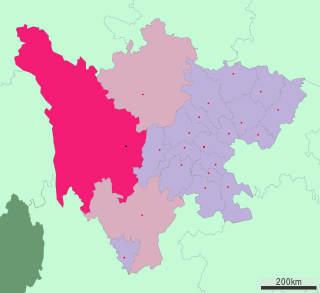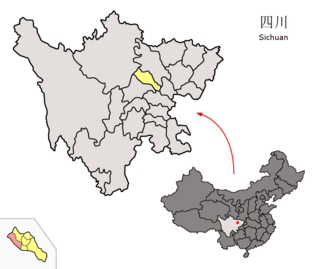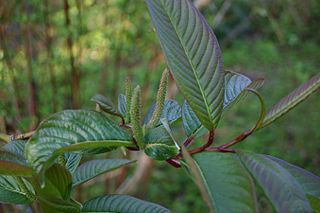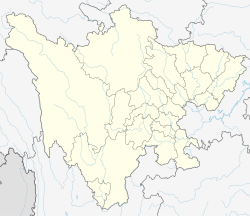
Dujiangyan is a county-level city of Sichuan Province, Southwest China, it is under the administration of the prefecture-level city of Chengdu. Its north-west region forms a border with southern Ngawa Tibetan and Qiang Autonomous Prefecture. It has an area of 1,208 km2 (466 sq mi) and had a population of 710,056 in 2020.

Langzhong is a county-level city in northeastern Sichuan province, China, located on the middle reaches of the Jialing River. It is administered as part of the prefecture-level city of Nanchong. Langzhong has a total population of 880,000, with 250,000 residing in the urban area.

Ziyang prefecture-level city in eastern Sichuan province, China. It is bordered by the provincial capital of Chengdu to the northwest, Deyang to the north, Suining to the northeast, Chongqing municipality to the east, and Neijiang to the west. Its development is going to be very important because of the proximity of Chengdu new Airport and economic zone. As of the 2020 Chinese census, Ziyang's total population was 2,308,631 inhabitants whom 867,119 lived in the built-up area made of Yanjiang District.

Garzê Tibetan Autonomous Prefecture, often shortened to Ganzi Prefecture, is an autonomous prefecture in the western arm of Sichuan province, China bordering Yunnan to the south, the Tibet Autonomous Region to the west, and Gansu to the north and northwest.

Laurent-Joseph-Marius Imbert, affectionately known in Korea as Bishop Laurentius Bum Sehyeong was a Roman Catholic French bishop in Asia. He was most notable for his Christian missionary work among the Koreans, he was appointed by Pope Gregory XVI in August 1836 when first Bishop Barthélemy Bruguière died in Manchuria.

The golden snub-nosed monkey is an Old World monkey in the subfamily Colobinae. It is endemic to a small area in temperate, mountainous forests of central and Southwest China. They inhabit these mountainous forests of Southwestern China at elevations of 1,500–3,400 m (4,900–11,200 ft) above sea level. The Chinese name is Sichuan golden hair monkey (四川金丝猴). It is also widely referred to as the Sichuan snub-nosed monkey. Of the three species of snub-nosed monkeys in China, the golden snub-nosed monkey is the most widely distributed throughout China.

Forrest's pika is a species of mammal in the pika family, Ochotonidae. It is found in Bhutan, China, India, and Myanmar. The summer dorsal pelage and ventral pelage are dark rufous or blackish brown, and the winter dorsal pelage is a grayish brown, slightly lighter in tone than the ventral pelage. It is a generalist herbivore. It was assessed by the IUCN Red List of Endangered Species as insufficiently known in 1994, as near threatened in 1996, and re-assessed in 2008 as a species of least concern.

The Moupin pika, also known as Moupin-pika, and Manipuri pika, is a species of mammal in the pika family, Ochotonidae. It has many subspecies, some of which may be distinct species. Its summer pelage is dark russet-brown with some light spots on the dorsal side, and ochraceous buff tinged on the belly. In winter it is lighter, with buff to dull brown dorsal pelage. A generalist herbivore, it is found in the mountains of the eastern Tibetan Plateau in China, Bhutan, India (Sikkim), and northern Myanmar. Both the International Union for Conservation of Nature Red List of Endangered Species and the Red List of China's Vertebrates classify it as a species of least concern; although one subspecies may be endangered.

Thomas's pika, also known as the Thomas-pika, is a species of small mammal in the pika family, Ochotonidae. The fur on its upper body is reddish brown in summer, and mouse grey in winter. It is a generalist herbivore threatened by habitat loss, being found on isolated peaks of the eastern Qilian Mountains in Qinghai, Gansu, and northwestern Sichuan, in China. The International Union for Conservation of Nature Red List of Endangered Species assessed the animal as insufficiently known in 1994, as near threatened in 1996, and as a species of least concern in 2008.

Beichuan Qiang Autonomous County is a county under the jurisdiction of Mianyang City in northern Sichuan province, China. It is located in an ethnically diverse mountainous region of Sichuan. Its Chinese name literally means "North" (bei) "River" (chuan). Its new county seat is located at Yongchang after the 2008 Sichuan earthquake.

Shifang is a county-level city in Sichuan, China, under administration of Deyang prefecture-level city. It is located directly about 50 kilometers (31 mi) from Chengdu. It had an area of 863 km2 (333 sq mi) and a population of 430,000 in 2004. Shifang has a history stretching back over two thousand years. It suffered heavy damage during the 2008 Sichuan earthquake. The city was also the scene of a large-scale environmental protest against a copper smelting plant in July 2012.

Jiange County is a county of Sichuan Province, China. It is under the administration of Guangyuan city. The history of Jiange County as a county division goes back around 1700 years. The county has historically been a junction between the north and south of Western China, through the Jianmen Pass. It is a popular tourist destination in Sichuan.
Microtoena is a genus of flowering plants in the mint family, Lamiaceae, first described in 1889. It is native to eastern and southeastern Asia, primarily China.
- Microtoena albescensC.Y.Wu & S.J.Hsuan - Guizhou
- Microtoena bhutanicaStearn - Bhutan
- Microtoena coreanaH.Lév - Korea
- Microtoena delavayiPrain - Sichuan, Yunnan
- Microtoena esquiroliiH.Lév. - Yunnan, Guizhou, Guangxi
- Microtoena griffithiiPrain - Arunachal Pradesh, Bangladesh
- Microtoena insuavis(Hance) Prain ex Briq. - Thailand, Vietnam, Guangdong, Guizhou, Yunnan
- Microtoena longisepalaC.Y.Wu - Sichuan
- Microtoena maireanaHand.-Mazz. - Yunnan
- Microtoena megacalyxC.Y.Wu - Guizhou, Yunnan
- Microtoena miyiensisC.Y.Wu & H.W.Li - Sichuan
- Microtoena mollisH.Lév. - Guizhou, Yunnan, Guangxi
- Microtoena moupinensis(Franch.) Prain - Tibet, Sichuan
- Microtoena muliensisC.Y.Wu - Sichuan
- Microtoena nepalensisStearn - Nepal
- Microtoena omeiensisC.Y.Wu & S.J.Hsuan - Sichuan
- Microtoena patchoulii(C.B.Clarke ex Hook.f.) C.Y.Wu & S.J.Hsuan - from Yunnan + Nepal south to Java
- Microtoena paucifloraC.Y.Wu - Yunnan
- Microtoena praineanaDiels - Guizhou, Sichuan, Yunnan
- Microtoena robustaHemsl. - Sichuan, Hubei
- Microtoena stenocalyxC.Y.Wu & S.J.Hsuan - Yunnan
- Microtoena urticifoliaHemsl. - Hubei, Hunan
- Microtoena vanchingshanensisC.Y.Wu & S.J.Hsuan - Guizhou
- Microtoena wardiiStearn - Tibet, Bhutan, Arunachal Pradesh
Paranomis moupinensis is a moth in the family Crambidae. It was described by Eugene G. Munroe and Akira Mutuura in 1968. It is found in Sichuan, China.

Pidu District (郫都区), formerly known as Pi County or Pixian, is a district of the City of Chengdu, the capital of Sichuan, China. It presently covers an area of 437.5 square kilometers (168.9 sq mi), with a total population of 756,047 during the 2010 census. It was formerly known as the source of the best tobacco in Sichuan and is now well known for its doubanjiang, a type of spicy fermented bean sauce. It was established from the former Pi County by an approval from the State Council on November 24, 2016.

The northern Chinese boar is a subspecies of wild boar native to China and Vietnam. The subspecies was described by Alphonse Milne-Edwards in 1871. It also occurs in Sichuan. It is likely to be the ancestor of domestic pigs.
Submyotodon is a genus of vespertilionid bats, published as a new taxon in 2003 to describe a Miocene fossil species. Extant species and subspecies previously included in Myotis were later transferred to this genus. Species in this genus are referred to as broad-muzzled bats or broad-muzzled myotises.
The Moupin broad-muzzled bat(Submyotodon moupinensis) is a bat in the family Vespertilionidae endemic to southern China.

The presence of the Catholic Church in the southwestern Chinese province of Sichuan and city of Chongqing dates back to 1640, when two missionaries, Lodovico Buglio and Gabriel de Magalhães, through Jesuit missions in China, entered the province and spent much of the 1640s evangelizing in Chengdu and its surrounding areas. The Paris Foreign Missions Society assumed full responsibility for the Sichuan Mission in the 18th century.

Salix moupinensis, the Moupin willow, is a species of flowering plant in the family Salicaceae, native to western Sichuan and northern Yunnan, China. It resembles Salix fargesii and is available from commercial suppliers.

















